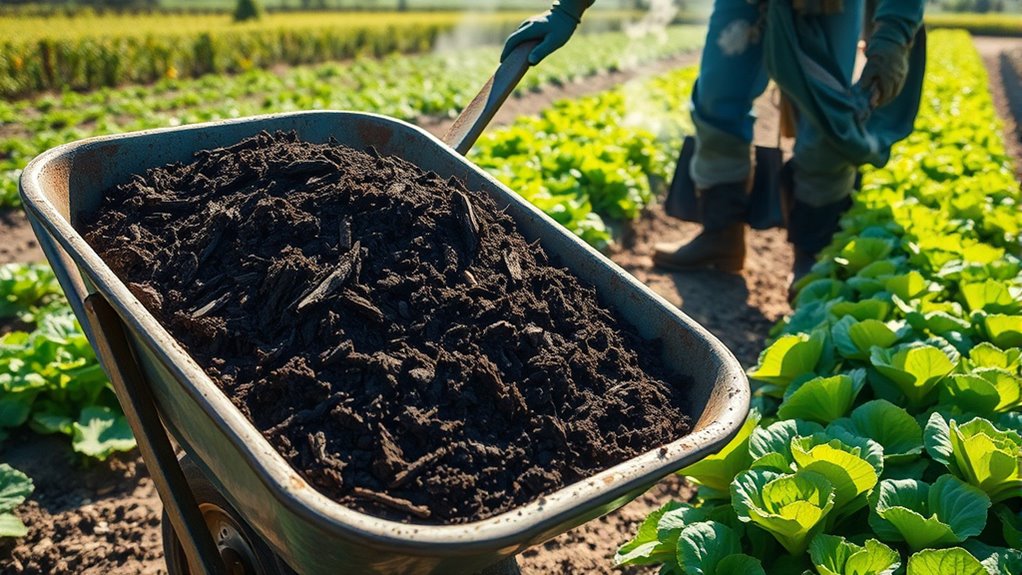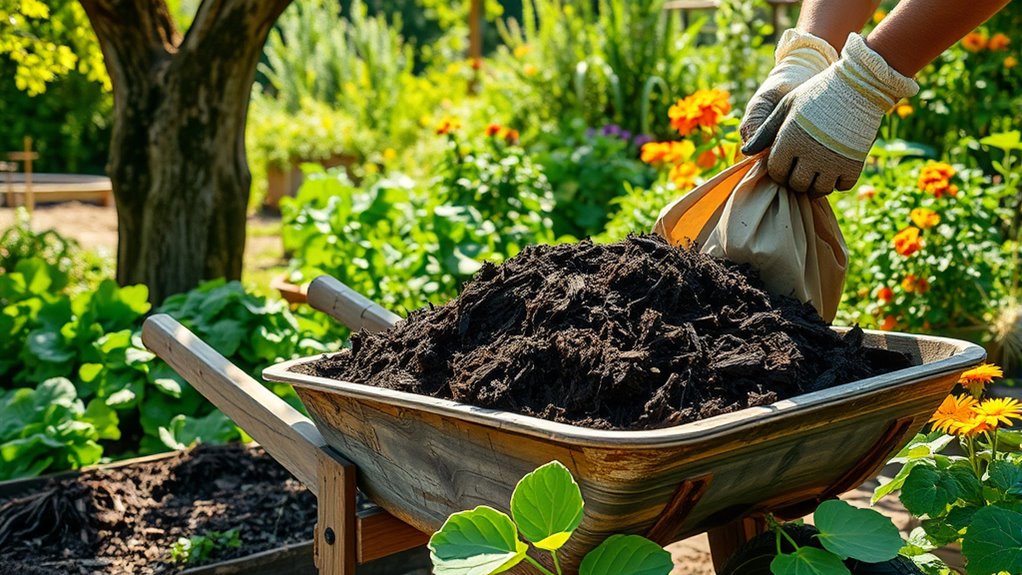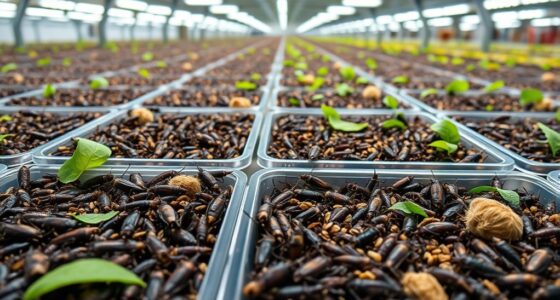To use animal manure safely as fertilizer, you should compost it properly by maintaining the right moisture, oxygen, and temperatures, aiming for at least 131°F for several days to kill pathogens. Store manure in covered areas and apply it carefully, ideally incorporating it into the soil rather than spreading it on the surface. Monitoring compost temperature and managing runoff helps protect health and the environment. Keep exploring to discover more about safe manure management practices.
Key Takeaways
- Compost manure thoroughly to reach at least 131°F (55°C) for three days to kill pathogens.
- Regularly turn the compost pile to ensure uniform heat and effective pathogen destruction.
- Store manure in covered, well-drained areas to prevent runoff and environmental contamination.
- Incorporate manure into the soil rather than applying on the surface for safer use.
- Use compost thermometers and monitor moisture and ventilation to maintain optimal conditions for pathogen reduction.

Using animal manure as fertilizer can boost your crop yields and improve soil health, but it’s crucial to do so safely to prevent health risks and environmental contamination. One of the most effective ways to handle manure safely is through manure composting. Composting transforms raw manure into a stable, nutrient-rich material that’s safer for your plants and reduces pathogen levels. When you compost manure properly, you accelerate the natural decomposition process by maintaining the right balance of moisture, oxygen, and temperature. Turning the compost regularly ensures that pathogens, such as bacteria and parasites, are effectively managed, breaking down harmful microorganisms that could otherwise pose health risks to humans, animals, or the environment.
Pathogen management is a critical aspect of using manure safely. Raw manure can harbor pathogens that, if not properly managed, could contaminate water sources, crops, or even pose health threats to farm workers and consumers. To mitigate this, you should aim for composting temperatures of at least 131°F (55°C) maintained for a minimum of three days, which is effective for pathogen destruction. Using a compost thermometer helps you monitor the internal temperature of the pile to ensure it reaches and sustains this safe level. Additionally, proper composting practices involve turning the manure regularly, which ensures uniform heat distribution and pathogen inactivation throughout the pile. Proper temperature management is essential for effective pathogen inactivation and safe manure utilization. Maintaining adequate moisture levels during composting also supports microbial activity and efficient decomposition, further reducing risks. Ensuring proper ventilation within the compost pile helps maintain oxygen levels and promotes even heat distribution, which is vital for pathogen destruction. Incorporating proper handling techniques further minimizes the risk of spreading contaminants and ensures safer application of manure. Moreover, integrating testing and monitoring of compost quality can help verify that pathogen levels are sufficiently reduced before application.
Beyond composting, storing manure correctly is crucial. Keep it in a covered, well-drained area to prevent runoff that could contaminate nearby water bodies. Avoid spreading manure on fields immediately before heavy rain; always give it sufficient time to break down and stabilize before planting or watering. When applying manure as fertilizer, incorporate it into the soil rather than leaving it on the surface. This practice reduces the risk of runoff and prevents pathogens from reaching water sources. Proper management of manure, including storage and application practices, plays a vital role in safeguarding environmental and human health.
Frequently Asked Questions
Can Animal Manure Be Used on Organic Gardens?
You can use animal manure on organic gardens if you follow proper composting methods and manure storage practices. Composting helps kill pathogens and reduces weed seeds, making manure safe for plants. make certain you store manure properly, away from water sources, and let it age for several months. This way, you protect your garden’s health while enriching the soil naturally, adhering to organic gardening standards.
What Are the Signs of Manure Contamination?
A wise gardener knows that “a little caution goes a long way.” When checking manure, look for contamination symptoms like foul odors, slimy textures, or unusual colors. Pathogen detection involves testing for harmful bacteria or parasites. If manure smells off or feels excessively wet, it’s a sign of contamination. Always observe these signs to prevent introducing pathogens into your garden and keep your plants and family safe.
How Do I Prevent Odors When Applying Manure?
To prevent odors when applying manure, you should use effective composting methods that reduce smell before application. Incorporate odor control techniques like adding carbon-rich materials such as straw or sawdust, which help absorb odors. Applying manure during cooler weather and avoiding over-application also minimizes smell. Proper aeration and timely application guarantee odors stay controlled, making manure use more environmentally friendly and less disruptive to your surroundings.
Is Manure Safe for Edible Crops Immediately After Application?
Think of your garden as a busy marketplace where fresh produce is sold. You wouldn’t sell goods too soon, risking customer safety. Similarly, applying manure immediately after spreading can pose pathogen risks and disrupt nutrient absorption. It’s best to wait at least 30 days for vegetables and 90 days for leafy greens before harvest, ensuring harmful microbes diminish and nutrients become available, making your crops safe and healthy.
Are There Specific Regulations for Manure Use in Urban Farming?
You need to check urban regulations in your area regarding manure use, as rules can vary widely. Some cities require manure permits or have restrictions on applying manure near water sources or public spaces. It’s crucial to follow local guidelines to ensure safety and compliance. You should contact your local health or environmental department to understand specific manure permits and regulations for urban farming to avoid violations.
Conclusion
By handling animal manure with care, you can turn a natural gift into a nourishing boost for your garden without any worries. When you follow proper safety steps, you’re simply giving your plants a gentle, wholesome embrace that promotes healthy growth. Think of it as sharing a warm, earthy hug from nature itself—allowing your garden to flourish happily and safely. Embrace these simple practices, and you’ll enjoy a thriving, vibrant garden year-round.










